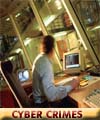Tackling cyber-crimes, a challenging task
Source: The Hindu
By Tamil Nadu-Chennai
Date: August 08, 2003
 A woman in her twenties was found charred to death on the terrace of her house in city and her parents were convinced that she had been murdered, and the body burnt. With mounting pressure from them, the police arrested the girl's husband and his parents on charges of murder. The CID too took up investigation of the case and it was only with the findings of the Forensic Experts was the mystery unravelled. The investigating agency concluded that the girl had immolated herself, even as it framed charges against her husband and in-laws for dowry harassment.
A woman in her twenties was found charred to death on the terrace of her house in city and her parents were convinced that she had been murdered, and the body burnt. With mounting pressure from them, the police arrested the girl's husband and his parents on charges of murder. The CID too took up investigation of the case and it was only with the findings of the Forensic Experts was the mystery unravelled. The investigating agency concluded that the girl had immolated herself, even as it framed charges against her husband and in-laws for dowry harassment.
Forensic experts conduct detailed, elaborate and pointed investigations at the scene of crime. "There is a very thin line for the investigator to determine whether a woman whose body is found burnt, was a murder victim or had committed suicide. The smoke deposition patterns, peri-mortem (dying moments) injuries and blood smears vary", according to an expert. He adds that they essentially work at prompt recognition of evidence at the scene of crime as "it alone can effectively and scientifically reconstruct the events to prevent imaginary accusations".
The intricacies involved in forensic work and the critical nature of such evidence in arriving at the truth, were highlighted at a meeting at Sri Ramachandra Medical College and Research Institute, Porur on Friday by professionals from various departments, including the Police.
Professor of Forensic Medicine, Pradeep Kumar, of Manipal was of the view that a doctor who visits the scene of crime should conduct the autopsy too, which is not the case here. A visit to the scene of crime before the body is removed provides the most vital clues. "Eyes see far more at the scene of crime than the mind from a distance", he says. He adds that even the process of bringing the body to the morgue is of crucial importance. If improperly handled, vital clues could be lost.
The significant developments in the field of conventional forensic science have, however, not extended to Cyberforensics, especially with more incidents of cyber crimes likely to be reported in the future. Cyberforensics is probably at its lowest ebb and even police officials themselves acknowledge that no concrete steps have been taken to modernise this unit in the city. Some of them are of the view that "even today, cyber-policing seems to be restricted to the notion of being a large data-base with policemen simply adding on general information for storage".
Tackling cyber-crimes will soon emerge as one of the toughest challenges, what with access to computers and the Internet made available. According to officers who are involved in tackling cyber-crime in the city, while the hackers are well armed, they are themselves without much resources. "We are just not equipped with the armour to fight against the two essential forms of cyber-crimes--sabotage, and theft of intellectual property", N.Venkatesan, sub-inspector, CB-CID points out and adds that it has begun to be used as a medium for money laundering and hawala transactions.
The police lament that they do not have the experience as they do not have their own forensic investigators and examiners. With the little talent available at their disposal, it become extremely difficult for the police with limitations of tools to combat hackers who use multiple operating systems and who also resort to mapping their networks. Even today, policemen investigating high-tech crimes are forced to depend on professionals and also hire experts to go ahead with the job. The recent cases of a youth hacking into ATMs using copied cards and gangsters easily breaking into satellite codes will only test the policemen in the weeks to come.
Experts point out that the studies in their laboratories do not solve crimes as such but only add to the investigation process and helps with further evidence gathering. The work that they do in the labs reveals a whole lot of things that is impossible for the naked eye to observe. Their findings are authentic and accepted as such by courts of law everywhere. Every criminal leaves behind some clue and it is left to the intelligence and the experience of the investigating agency to recognise and follow it up. It ultimately depends on how well-equipped the forensic experts and the sleuths of the various investigating agencies are, that determine the fate of every single crime case reported in the metropolis.
Original article at: http://hinduonnet.com/stories/2003080908890300.htm
^macro[showdigestcomments;^uri[];Tackling cyber-crimes, a challenging task ]